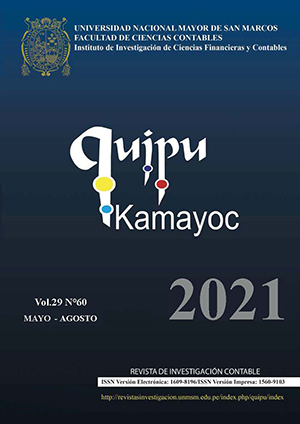The principle of contributive capacity in relation to the health emergency COVID-19 in Ecuador, 2019 - 2020
DOI:
https://doi.org/10.15381/quipu.v29i60.20186Keywords:
Principle of contributory capacity, COVID-19, tax system, public spending, direct taxesAbstract
Objective: Analyze the principle of contributory capacity in relation to the health emergency COVID-19. Method: The research was focused on the documentary, exploratory and descriptive study. The information was selected from the critical reading of documents and bibliographic materials, as well as official information and statistical data from national and international organizations. Results: The health emergency caused by COVID-19 has had consequences not only on people’s health, but also at social and economic levels; therefore, governments are applying various policies to overcome the crisis they are facing. In Ecuador, in the first four months of 2020 tax collection was lower by 534 million dollars compared to 2019, amount that meant a great challenge for the State as it had to generate resources to cover up for the public expenses demanded by society. Conclusion: The tax system must be configured in such a way that those with the greatest economic capacity to pay contribute to a greater extent in sustaining public charges through the prioritization of direct and progressive taxes.
Downloads
Downloads
Published
Issue
Section
License
Copyright (c) 2021 Milca Naara Orellana Ulloa, Néstor Daniel Gutiérrez Jaramillo, Jeri Gloria Ramón Ruffner de Vega

This work is licensed under a Creative Commons Attribution 4.0 International License.
AUTHORS RETAIN THEIR RIGHTS:
a. Authors retain their trade mark rights and patent, and also on any process or procedure described in the article.
b. Authors retain their right to share, copy, distribute, perform and publicly communicate their article (eg, to place their article in an institutional repository or publish it in a book), with an acknowledgment of its initial publication in Quipukamayoc .
c. Authors retain theirs right to make a subsequent publication of their work, to use the article or any part thereof (eg a compilation of his papers, lecture notes, thesis, or a book), always indicating the source of publication (the originator of the work, journal, volume, number and date).






